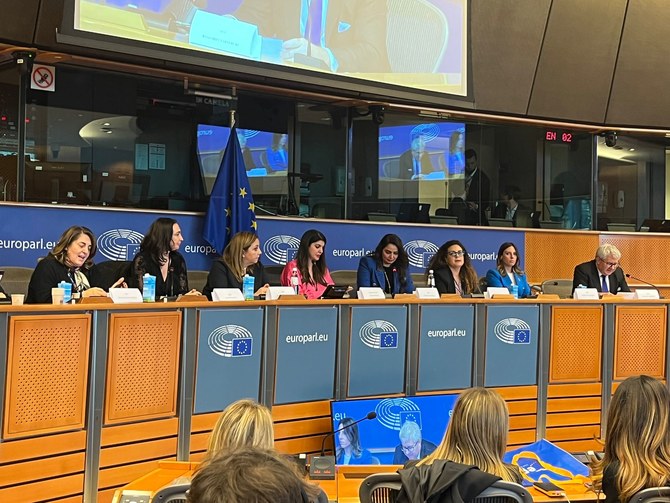The international community has been urged to do more to tackle human rights violations committed by the Iran-backed Houthis in Yemen.
And speakers at a special conference on the issue also called for the militia group’s leaders to be prosecuted in international courts for their war crimes.
Atrocities carried out by the Houthis against women and children were among a catalogue of incidents highlighted at the recent meeting in Brussels organized by the Group of the European People’s Party in the European Parliament.
Guest speaker, Dr. Wesam Basindawa, head of the Yemeni Coalition of Independent Women, told members of the European Parliament and representatives of EU institutions about cases of physical and sexual violence toward women and children, the recruiting of children as soldiers, and brutal attacks against minorities.
She said the Houthis had obstructed the delivery and distribution of humanitarian aid and carried out cross-border terrorist attacks on civilian targets in neighboring Saudi Arabia and the UAE.
The group had also turned schools and educational facilities into camps and weapons stores, breaching international humanitarian and human rights laws.
And she pointed out that religious and ethnic minorities in Yemen, such as the Jewish and Baha’i communities, had seen many of their rights and basic freedoms restricted by the Houthis.
Basindawa said: “We and the international community must do more work and put pressure on this terrorist militia, tighten sanctions against it, prosecute its leaders, and try them in international courts as war criminals.”
MEP Isabella Tovaglieri, a member of the European Parliament Committee on Women’s Rights and Gender Equality, said women were the worst-affected and most vulnerable category in conflict zones and needed to be protected against rape, kidnapping, forced marriage, and poverty.
“Europe should help women in peacebuilding and in conflict resolution,” she added.
Addressing the conference, MEP Luisa Regimenti spoke about physical and psychological violence toward women and the importance of providing victim support services.
Another MEP, Ryszard Czarnecki, said the Houthis had targeted civilians during attacks in Marib and at Al-Thwara hospital, adding that the group had set fire to an overcrowded detention center housing African refugees.
Also speaking at the conference was MEP and Committee on Women’s Rights and Gender Equality member, Isabella Adinolfi. She noted the need to support female teachers, intellectuals, and journalists who were working to raise awareness about the humanitarian crisis in Yemen.
MEP Gianna Gancia said the war in Yemen had created a critical situation for women and girls and that “from the beginning of the conflict seven years ago, the EU had made diplomatic efforts and provided financial support to Yemen through humanitarian assistance and development.”
Alessandra Illuticini, president of Progetto Donna 2021, told delegates of the atrocities meted out toward women in Houthi-controlled areas such as the forced wearing of niqabs, child marriage, honor killings, and domestic violence.
She pointed out the need to work closely with the UN and human rights organizations to empower women and protect them as well as support their fight for rights.
MEP Lucia Vuolo said: “Yemen remains one of the world’s worst humanitarian crises. Conflict across Yemen continues to endanger civilians, trigger displacement, and damage civilian infrastructure such as hospitals and schools.”
Simona Russo, coordinator of the Fight Impunity association, said the serious situation in Yemen was one “that we should not forget.”
Program host, MEP Fulvio Martusciello, said he had been working for more than three years on raising awareness about the humanitarian crisis in Yemen.
He and his European Parliament colleagues had written to Joseph Borrell, high representative of the EU for foreign affairs and security policy, calling for the Houthis to be designated as a terrorist group.
MEP Anna Cinzia Bonfrisco said: “We need to encourage women peacebuilders and help them establish a dialogue between the different parties in Yemen. Women should be active members of the peace negotiations in Yemen.”
Closing the session, conference moderator, Manel Msalmi, said the EU as a peace actor should work closely with civil society organizations in Yemen to empower female leaders.

